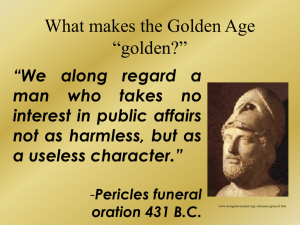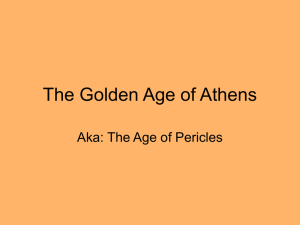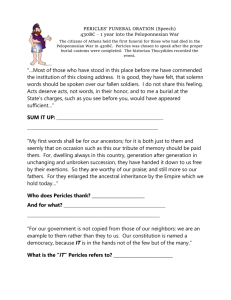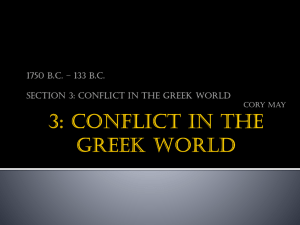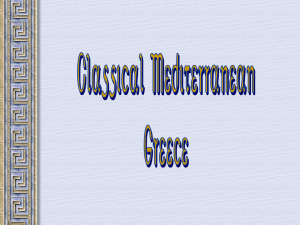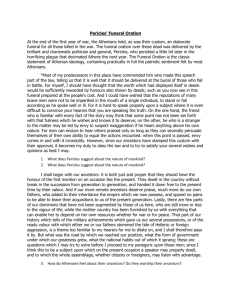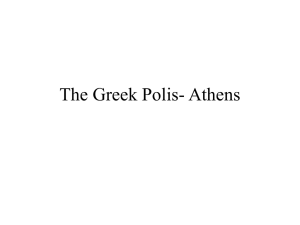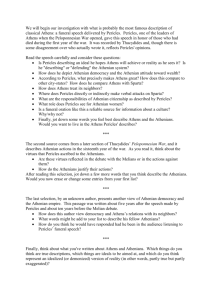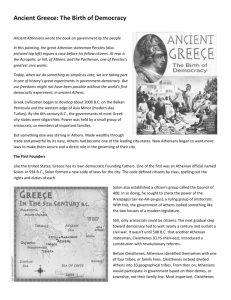Chapter 5 Section 3 Democracy and Greece*s Golden Age
advertisement
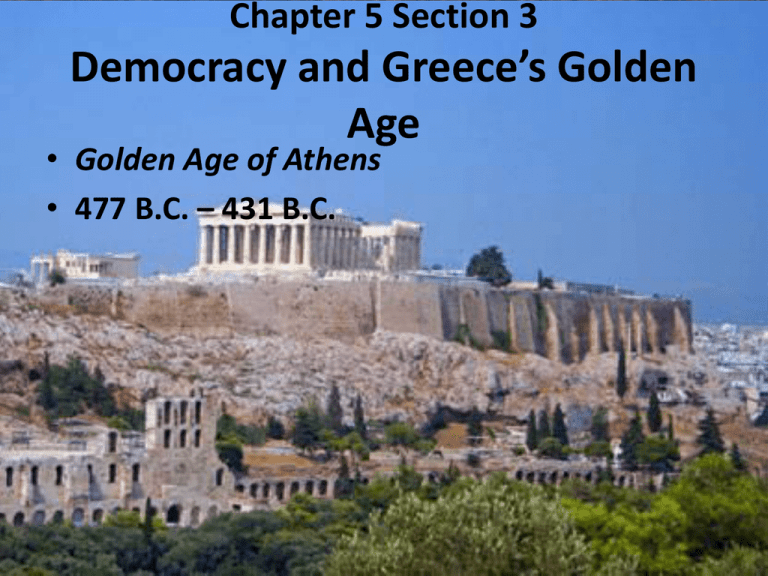
Chapter 5 Section 3 Democracy and Greece’s Golden Age • Golden Age of Athens • 477 B.C. – 431 B.C. Pericles’ Plan for Athens Pericles was a statesman who influenced life in Athens for 32 years. Pericles had three goals 1. Create a Stronger Democracy Increased number of public officials and they were paid Pericles developed a direct democracy. What is it? Citizens rule directly, not through representatives 2. Athenian Empire Pericles took money from the Delian League’s treasury to strengthen the navy Other members of Delian League were treated as part of the empire Peloponnesus cities (Sparta) resisted Athens and formed their own alliances 3. Glorifying Athens Without League’s approval, Pericles used money to beautify Athens Glorious Art and Architecture • Wanted to create magnificent sculptures and buildings like the Parthenon Architecture and Sculpture Phidias worked on the Parthenon Works portrayed ideal beauty not realism These works became known as classical art Phidias Drama and History • Greeks created drama as an art form and built the first theaters Tragedy and Comedy Tragedy: serious drama about common themes Hero usually had a flaw such as hubris. 3 tragedy writers Aeschylus who wrote Oresteia a story based on Agamemnon Sophocles wrote Oedipus the King and Antigone Euripides wrote Medea Tragedy and Comedy Cont.d’ Comedies had slapstick and crude humor Aristophanes wrote The Birds and Lysistrata History Homer’s records are not accurate. Herodotus accurately reported events Athenian Thucydides was the greatest historian Athenians and Spartans Go to War Other Greek citystates looked at Athens in a negative way 431 B.C. Sparta declared war on Athens Peloponnesian War Athens vs. Spartans Athens had a stronger navy, Sparta had a stronger army Pericles wanted to avoid land battle and attack on the sea Spartans marched into Athenian territory and burnt their food supply Peloponnesian War Cont.d’ Pericles brought people into the city walls Food could be brought by ships that sailed into the ports of Athenian colonies. 2nd year of war a plague swept through Athens killed 1/3 of the population including Pericles. 421 B.C. a truce was signed Sparta Gains Victory Peace didn’t last 415 B.C. Athenians sent a fleet with 20,000 soldiers to Sicily attempting to destroy Syracuse, Sparta's ally 413 Athens was defeated In 404 B.C. Athenians and allies surrendered Philosophers Search for Truth Athenians questioned Democratic government Philosophers emerged to seek the truth and based their findings on two assumptions 1. The universe is put together in an orderly way and subject to absolute and unchanging laws. 2. People can understand these laws through logic and reason. Philosophers Search for Truth Protagoras, a philosopher in the Sophists group, questioned the existence of traditional Greek gods Socrates Critic of the Sophists Stated absolute standard did exist for truth and justice Either people admired him or thought he was strange He encouraged students to examine their beliefs Asked them questions to show that people had contradictory opinions These question/answer sessions led to the Socratic method Socrates Cont.d’ 399 B.C. he was brought to trial for “corrupting the youth of Athens” and “neglecting the city’s gods” Socrates said his teachings were good Jury condemned him to death He drank hemlock and died Plato Student of Socrates Founded a school called the Academy Wrote his most famous work, The Republic Described his perfectly governed society Not a democracy Plato Cont.d’ His ideal, citizens fell into three groups Farmers and artisans, warriors, and ruling class His rivals, Socrates and his pupil Aristotle PLATO ARISTOTLE Aristotle Questioned the nature of the world and human belief, thought and knowledge Invented a method for arguing according to logic. This provides the basis of the scientific method used today. Aristotle Cont.d’ Opened a school called the Lyceum. Alexander, son of King Philip II of Macedonia, was one of his most famous pupils Taught him at age 13 until he was called back home at age 16.


